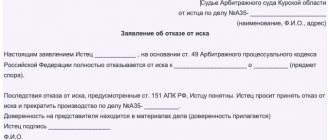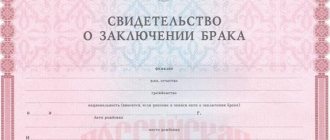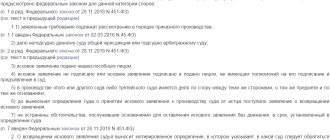A significant part of citizens care in advance about who will get their property after death. However, circumstances often arise that prompt a person to change his will regarding future heirs during his lifetime. How to revoke a will during your lifetime in such a situation?
Not everyone knows how and where everything can be done. First you need to figure out whether it is necessary to cancel the will at all, and only then begin to implement your plans.
The article will tell you in detail about the nuances of the process under consideration. All the legal subtleties of the legal relationship that people encounter will be outlined.
How to cancel a will for an inheritance during your lifetime?
There are 2 options for canceling the owner’s will in the event of his death:
- Cancellation order.
- New will.
A citizen has the right to make his own decision. Let's consider each of the options.
Order to revoke a will
A revocation order is a written document that seeks to revoke a will. It can be drawn up at any notary office of the testator’s choice.
The document completely cancels all expressions of will that were ever drawn up by the testator. The law provides for the mandatory written notarial form of a document.
To certify a document, you must pay a state fee of 100 rubles. and notary services (depending on the region, the testator will pay from 450 to 500 rubles).
Sample order
New will
During his lifetime, the owner has the right to make an unlimited number of wills. Moreover, each new one cancels the old one if it provides for the distribution of the same property.
If the owner wants to cancel part of the old will completely, then he must indicate this in the new one.
The document can be drawn up in any notary office of the testator’s choice. It is not necessary to draw up all orders with one notary.
The testator can be sure that the documents will not be mixed up, since each notary must enter information about the new will into a single register.
Each document is paid for as an independent expression of will. The uniform state duty is 100 rubles. (Article 333.24 of the Tax Code of the Russian Federation). The cost of legal and technical services varies depending on the subject of the Russian Federation.
For example, in 2021 in Moscow you need to pay 2,400 rubles, and in the Kaluga region - no more than 2,000 rubles.
In the event of the death of the owner, the property will be distributed in accordance with the latest version of the document.
When does a will come into force after the death of the testator?
Is it possible to rewrite a will at a notary or replace it with a deed of gift?
What does judicial practice say in cases of cancellation or change of a will?
There are no special statistics on such cases. Judicial practice contains a sufficient number of examples when the demands of heirs were satisfied. A newly drawn up document containing instructions to cancel the expression of will or change it, as well as the order to cancel it, were declared invalid.
However, the courts also refused to satisfy such claims - when there were no legal grounds for declaring the document invalid and the necessary evidence.
How to cancel a will by an heir?
A will is a gratuitous transaction.
Therefore, all the requirements established for contracts apply to it. That is, the document can be declared void or voidable. An insignificant expression of will does not need to be challenged in court. This is a document that obviously has no legal force. If you bring it to a notary, he will refuse to accept it for issuing a certificate of inheritance rights.
For example, this is a will made in simple written form. In the absence of a notarization or certification by persons replacing a notary, the document has no legal force.
The situation is more complicated with a declaration of will drawn up in an emergency situation. The document is drawn up in simple written form and certified by witnesses. But to enter into the inheritance, he must be certified by the court. Otherwise, it is also considered void.
A voidable will is a document that was drawn up in violation of the law. But this fact must be proven.
The challenge procedure is possible only in court. It is necessary to declare your rights within 1 year from the moment the heir learned about the expression of will.
Among them:
- the testator was declared incompetent by the court at the time of execution of the document;
- the owner was drunk, under the influence of strong medications or drugs;
- the testator was intimidated by the use of force or threats;
- the testator was deceived by the heir;
- the owner had a mental illness and did not understand the consequences of his actions.
In such situations, the heirs can go to court and challenge the will. But you need to carefully prepare, collect documents and invite witnesses. Courts rarely grant such claims.
Procedure
Algorithm of actions for heirs:
- Preparation of evidence.
- Filing a claim.
- Referral to the court at the place of residence of the defendant (heir indicated in the will).
- Notary's warning about the suspension of issuing a certificate of inheritance rights.
- Attending a court hearing.
- Obtaining a court decision.
- Transferring the decision to a notary (not earlier than 30 days after the court makes the decision).
List of documents
Documents for the claim:
- the applicant's civil passport;
- will;
- death certificate of the deceased;
- documents that confirm relationship with the deceased;
- receipt of payment of state duty;
- request for a post-mortem examination;
- medical documents of the deceased;
- other evidence.
If the applicant claims that the deceased was mentally ill and could not understand the consequences of actions due to medications, then an examination is necessary. Only an expert can make a decision about the state of mental health of the testator at the time of registration of the will. The court will not make such conclusions based solely on the testimony of witnesses.
If the heir believes that at the time of the expression of the last will the owner was drunk, then he must also request the appointment of an examination. Only handwriting studies. The expert will check the signature on the will and other documents signed by the deceased and issue an opinion.
Statement of claim
An application to the court must be made in writing. The document must include the following information:
- name of the court;
- data of the heir who initiates the process;
- data of the defendant (heir by will);
- document's name;
- information about the testator (full name, date of death);
- relationship between the plaintiff and the testator;
- information about the will;
- reasons for challenging the document;
- reference to law;
- request for recognition of the will as invalid;
- request to appoint an examination;
- petition to call witnesses;
- a request to recover from the defendant the costs of a lawyer and state fees;
- list of documents;
- date and signature.
Sample statement of claim
Expenses
When initiating a dispute to challenge the expression of will, you will have to incur the following costs:
- State duty – 300 rub.
- Costs for a lawyer - from 2,000 rubles. (for filing a claim) and from 10,000 rubles. (for representation in court).
The claim must indicate that the court recovers these costs from the defendant. But reimbursement of expenses is provided only if the claim is satisfied.
Cancellation procedure
If the document is canceled at the will of the applicant, the procedure will be extremely simple.
He will have to contact a notary and issue either a new order or cancel the one in force at that time. Both actions will terminate existing wills. At the will of other persons, cancellation is possible only through the court. The procedure consists of several stages and is performed in the following order :
- Clarification of circumstances and analysis of the situation. It is necessary to determine for what reason the order can be canceled.
- Collection of documentation and evidence.
- Drawing up a statement of claim and filing it with the appropriate court.
The claim will have to meet certain requirements, that is, contain information about:
- the court in which it is filed;
- parties to the process, that is, the plaintiff, defendant and third parties, if present;
- about the circumstances of the case, starting from the date of drawing up the will and the death of the testator and ending with the reasons why the document must be annulled;
- about the legal acts on which the applicant relies;
- about the evidence that a party uses to support its position.
The application must contain a list of attachments to the claim. The most commonly used documents are:
- About the identity of the applicant. This can be either a passport or any other document expressly permitted for these purposes by law, for example, a temporary identity card.
- Confirming relationship with the deceased, if necessary in the context of the case.
- About the physical and psychological condition of the testator, if such information is available.
- On the rights of other persons to objects.
Also attached to the claim are petitions and statements that are necessary as part of the process, for example, about the collection of evidence.
The court will request evidence at its request only if the applicant proves that he could not obtain it on his own. For example, provide postal documents indicating that a letter was sent to the appropriate authority, which remained unanswered.
The list of attached documents can be significantly expanded. It all depends on specific circumstances and factors.
Download the statement of claim for invalidation of the will (sample)
Life situations
As practice shows, more complex situations arise in life with the revocation of a will. Let's consider these options.
Can there be two wills?
The law does not limit the right of a citizen to draw up wills. Therefore, he has the right to draw up one general statement of will or several different ones. If the property specified in them does not overlap, then the heirs will enter into inheritance rights under all documents at the same time.
Example. Ivan made a will for an apartment for his daughter. A year later he entered into a new marriage. In marriage he had a son. The man bequeathed him a house. After 2 years, Ivan inherited a summer cottage and bequeathed it to his wife. After his death, each of the heirs assumed rights under a separate document.
How can I revoke a will made in an emergency?
In a situation where a person’s life is in danger, he has the right to draw up a will and have it certified by the signatures of 2 adult witnesses. Such a document is valid in an emergency situation and for 30 days after its end. After this period, the testator must have it certified by a notary to confirm the firmness of his intentions.
If in an emergency the testator dies, then the successor must go to court to enter into the inheritance. He must prove that at the time the will was made, the life of the deceased was actually in danger.
Thus, in order to cancel a declaration of will drawn up in a dangerous situation, it is necessary:
- The testator should not have the document certified by a notary after the 30-day period. Then it will automatically lose its power. Before the expiration date, the document can simply be destroyed.
- For heirs - if the testator died in a dangerous situation after drawing up the will, the document can be annulled without going to court. In this case, the will is not valid. If other heirs not indicated in the document wish to challenge the expression of will, then the procedure is carried out through the court in accordance with the general procedure.
Cancellation and modification of a testamentary disposition
A testamentary disposition is an expression of the will of a citizen in the event of his death in relation to a specific account in a credit institution. It is drawn up at the bank and certified by a specialist from a credit institution free of charge.
You can change the order by drawing up a new testamentary order with the bank in relation to the same account.
You can cancel a document:
- By submitting a cancellation application to the credit institution.
- By making a will for this bank account.
- By drawing up an inheritance agreement in relation to this account.
Reasons for cancellation
In addition to the simple expression of the will of the testator about his reluctance to transfer the inheritance to specific legal successors, other reasons may include:
- The testator was not aware of his actions at the time of signing the will.
- The document is not in proper form (for example, there is no mark indicating that the transaction has been certified by a notary).
- The text violates current legislation.
- When drawing up the will, the testator was under the influence of strangers and pressure was exerted on him.
For older people, it is advisable to come to the notary with a certificate from a medical institution , which would confirm that the person is of sound mind and sober memory.
Lawyer's answers to frequently asked questions
The father made a will for his grandson. It turns out that I am deprived of my inheritance. Can I cancel this document while my father is alive?
Until the death of the citizen who made the will, the heirs do not have the right to challenge the document. A claim can be filed only after the death of the owner. To revoke a will, you will need to prepare strong evidence.
Is it possible to change a will if the testator does not remember which notary drew up the document?
You can change your will at any notary. It is enough to draw up a new document and have it notarized.
My grandmother drew up a will for the apartment in my name. A year later, my mother took my grandmother to live with her, and my grandmother drew up a deed of gift for me. Do I need to revoke the will now?
No. If at the time of the grandmother’s death, the apartment is no longer her property, then it cannot be inherited. No cancellation required.
The father made a will. He is now 80 years old. Can he rewrite the will?
Maybe. The law does not limit the age of the testator.
My grandmother wrote a will for her son (my father). A month ago he died. Does grandma need to revoke her will?
If she wants to transfer the property to another recipient, then she needs to leave a new will. Otherwise, the property will be transferred to the heirs by law.
What does the price of the service consist of?
For the certification of this unilateral transaction, the notary will only charge a state fee of 100 or 500 rubles . But you can always contact a lawyer who will help you draw up the text of the will. But the price of his services will vary and depend on:
- From the number of heirs.
- On the volume of inherited property and rights.
- On the complexity of the inherited property (it is possible to evaluate it or not).
- No need to visit a notary together with the testator.









